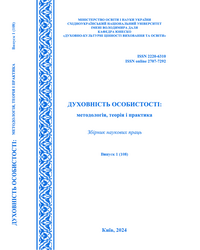SPIRITUAL DETERMINANTS OF THE PEDAGOGY OF COOPERATION OF ACADEMICIAN V. M. SYNOV
DOI:
https://doi.org/10.33216/2220-6310/2024-109-2-59-67Keywords:
cooperative pedagogy, education, spiritual values, societyAbstract
The article examines the scientific legacy of V.M. Synyov and its significance for contemporary pedagogy. The aim of the article is to analyze V.M. Synyov’s contribution to the development of the methodological foundations of cooperative pedagogy, considering the modern realities of social life. The main focus of the study is the spiritual determinants of cooperative pedagogy.
The article highlights the key psychological attitudes necessary for the successful implementation of cooperative pedagogy in correctional institutions, as well as approaches to preparing staff for working with inmates. Special attention is given to the humanistic ideas underlying cooperative pedagogy, particularly respect and demand towards individuals who have broken the law. Several key psychological attitudes, fundamental for the successful implementation of cooperative pedagogy in prisons, are presented. V.M. Synyov identifies attitudes such as empathy, openness in communication, social responsibility, an optimistic outlook on changes, emotional stability, attention to the personality of the inmate, and assistance in achieving success.
The article emphasizes the figure of the officer, who must be attentive, restrained, friendly, and demanding. Additionally, the officer’s appearance, fitness, and neatness are also important.
The article also highlights V.M. Synyov's scientific and practical achievements in implementing A.S. Makarenko’s pedagogical heritage in the work of correctional colonies for juvenile offenders. This includes creating positive relationships, activating the self-awareness of inmates, providing psychological assistance, and strengthening social ties.
Based on V.M. Synyov's scientific concepts, it is noted that the pedagogical culture of an individual, as a humanitarian value including ethical and aesthetic components, contributes not only to the quality performance of professional and social roles but also ensures authority and respect in society.
The results of the research can serve as a basis for further scientific investigations in the field of cooperative pedagogy and the development of innovative methods for the socialization of inmates.

